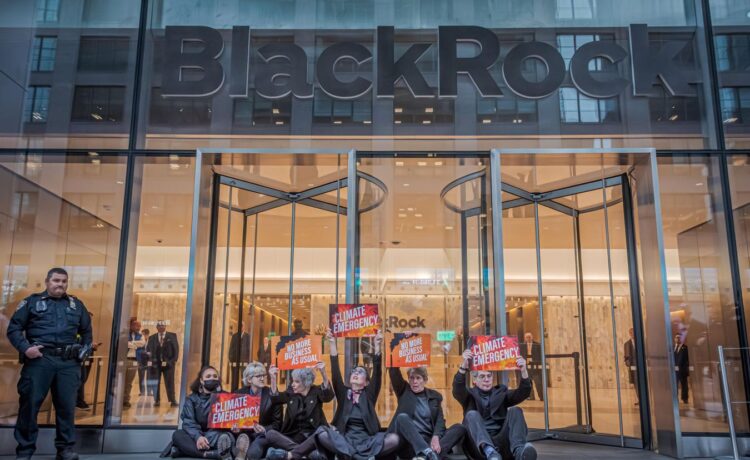Protestors outside BlackRock headquarters in New York last year. About 80 activists shut down the … [+]
ESG investing, the latest incarnation of socially-responsible investing, has gotten a bad rap, and at least half of it is deserved. But one fund is trying to be authentic to this thematic form of investing.
The Sphere 500 Climate Fund (SPFFX) seeks to decarbonize the benchmark by providing a fossil-free portfolio for people who don’t want to invest in companies helping to destroy the environment or adding to global warming. The fund takes the S&P 500 and removes all energy and utility stocks. Over the past twelve months, it’s been beating the market benchmark, posting a one-year return of 27.14% to the Vanguard S&P 500 ETF’s (VOO
Vanguard S&P 500 ETF
ESG is an acronym for Environmental, Social, and Governance-focused investing. For investors, it’s a way to screen companies and funds for policies that follow a more socially-responsible, progressive agenda and actually do something to achieve those goals.
Environmental screens look for companies that support protecting the environment, such as being fossil free.
Social factors include how corporations treat people. Inside the company, it looks at employee pay, working conditions, employee turnover, and protection of client data. Companies are also players on the broader society, so, they may be screened for diversity and need to comment on political issues, such as “Gay Pride Month.”
Governance evaluates companies based on their how well management runs the company. Does it have a strong board of directors, reasonable executive pay, and a shareholder-focus, such as giving dividends?
Global ESG assets surpassed $30 trillion in 2022 and are on track to surpass $40 trillion by 2030, according to a report from Bloomberg Intelligence.
The Securities and Exchange Commission’s (SEC) rule on naming funds is a consumer-protection tool that says if a fund puts an investment policy in its name, it’s required to invest at least 80% of the assets in investments aligned with that description. For example, large-cap stocks need to make up 80% of a large-cap fund.
“That didn’t work for ESG managers,” said Jason Britton, portfolio manager of SPFFX. “ESG terms were excluded; the words didn’t mean anything to the SEC. They didn’t know how to gauge the portfolios.”
ESG became what one Blackrock executive said was a vague grab-bag of ideas. This allowed fund providers to make up their own definitions of what was an ESG stock or fund. For example, a company could have great social attributes, but poor environmental attributes, and still make it into a fund.
This led to funds such as IShares ESG Aware MSCI USA ETF (ESGU
iShares MSCI USA ESG Optimized ETF
Conservatives, including Elon Musk, came out against the strategy accusing it of being woke-focused and detrimental to shareholders because if didn’t focus on maximizing total returns, which was often true.
Liberals weren’t happy either. They accused the fund companies of using the name purely for marketing and greenwashing portfolios that held companies with poor ESG records.
“The ESG criteria was never designed for investment products. They were created to access a company’s risk to ESG factors,” said Britton, the president and chief executive of Reflection Asset Management, the registered investment advisor (RIA) that runs SPFFX and an ETF. Based in Charleston, S.C., Reflection has $5.8 billion under advisement.
As the Harvard Business Review said, ESG was developed to evaluate “the impact of the changing world on a company’s profits and losses, not the reverse.”
In September 2023, the SEC amended the Name Rule’s protections by requiring funds with a specific thematic investment focus, such as ESG factors, to adopt the 80% investment policy and designate which stocks and funds fall into that bucket.
“ESG is the repurposing of bad data for the benefit of corporate management into a narrative to make people feel good about losing money,” said Britton.
In his Sphere 500 Climate Fund, Britton takes the S&P 500 and eliminates anything related to fossil fuel. Not just energy and utilities, but also infrastructure companies, that extract and refine fossil fuels. This leaves 414 companies, making it very tech heavy, which has helped it beat the benchmark this past year.
Reflections other fund, the politically-focused Democratic Large-Cap Core
Core
This fund again starts with the S&P 500 and excludes companies that don’t donate 75% or more of their political contributions to Democratic candidates and causes. These contributions can come from corporate-designated political action committees (PACs), as well as C-Suite executives. Designed to be alpha-producing, the screening process leaves 120 companies and Britton picks the top 40. It has an exchange ratio of 0.45%












